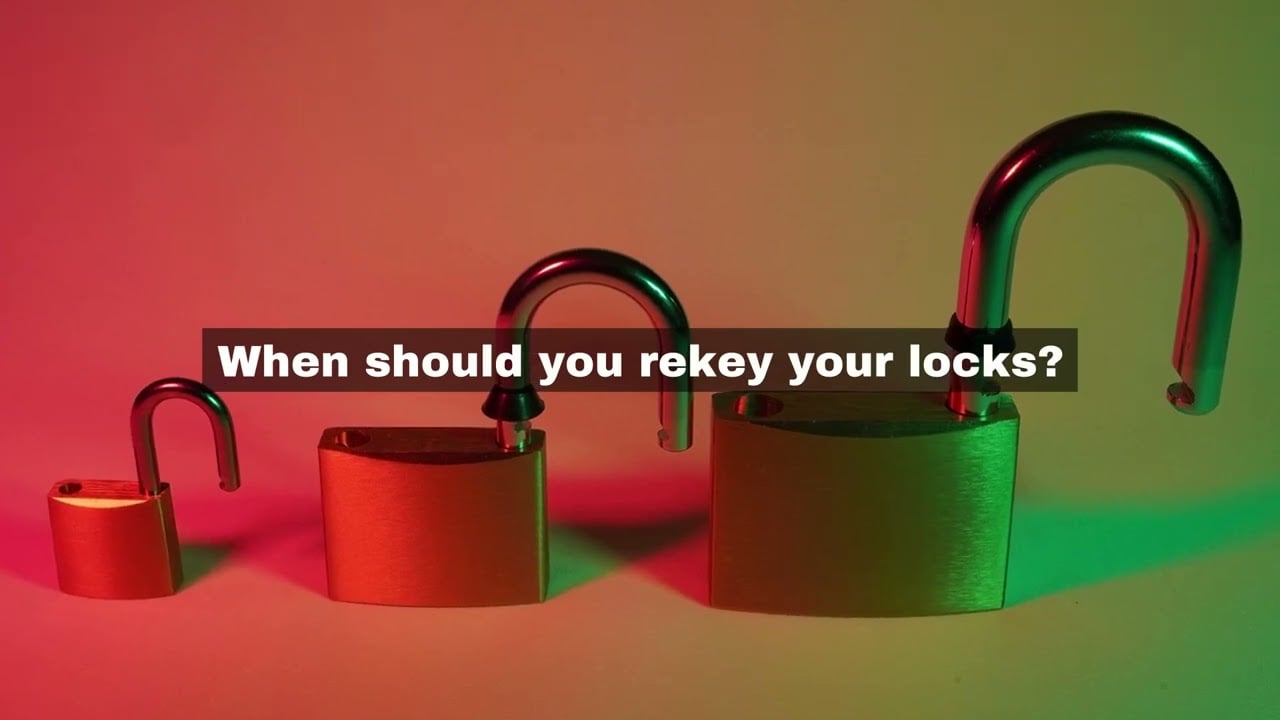You should rekey your business locks at least every six months, and immediately after any staff changes or security breaches. This practice keeps your premises secure and helps prevent unauthorized access. If you have high employee turnover or if you've lost keys, consider more frequent rekeying. Additionally, conducting an annual security review can help determine if further action is needed. Regular rekeying not only enhances security but also saves you money compared to full lock replacements. Curious about the signs that indicate it's time to rekey or about the benefits of hiring a professional for the job?
Key Takeaways
- Rekey business locks every 6 months to maintain security and manage access effectively.
- Conduct annual security reviews to assess rekeying needs based on current risks.
- Immediately rekey after employee departures or security incidents to prevent unauthorized access.
- High employee turnover may necessitate more frequent rekeying to safeguard assets.
- Regularly monitor access patterns to determine optimal rekeying schedules tailored to your business.
Importance of Lock Rekeying
When it comes to securing your business, rekeying locks is essential. Keeping your property safe not only protects your assets but also fosters trust among your clients and employees.
Regular rekeying helps to maintain a high level of security by ensuring that old keys can't be used to access your premises, especially after staff changes or security incidents. You might wonder how often to rekey locks, and the answer often depends on your specific circumstances. If you've had a recent employee turnover or a security breach, it's time to act.
Knowing when to rekey business locks can save you from potential threats. For instance, if you've lost a key or suspect unauthorized access, rekeying should be a priority.
Establishing a business lock rekeying schedule is a proactive approach to security. Regularly rekeying locks—perhaps every year or after significant changes—ensures that only authorized individuals have access to your premises. This practice not only enhances security but also allows for better management of access control, as discussed in lock rekeying benefits.
Recommended Rekeying Timelines
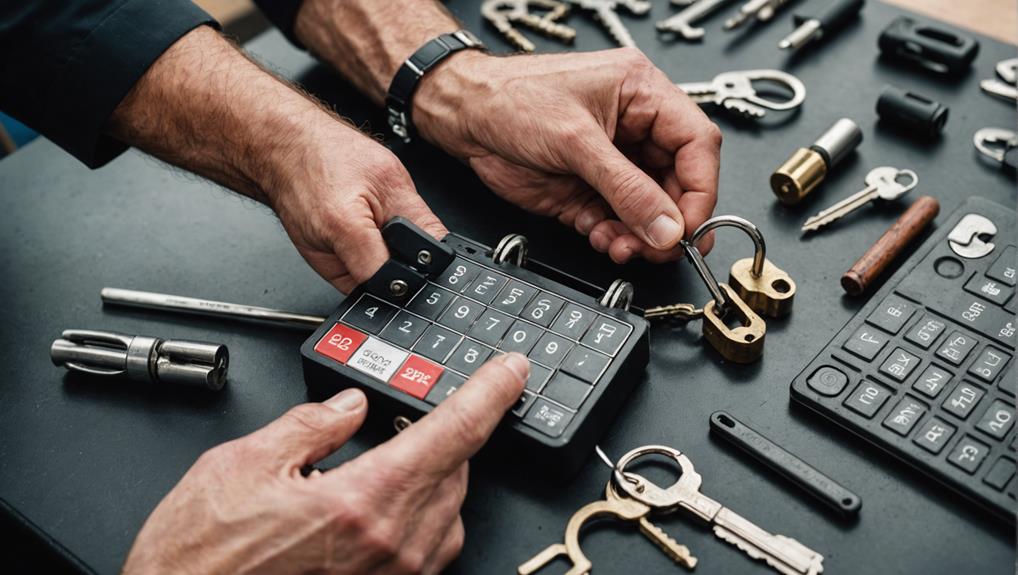
Establishing a clear timeline for rekeying locks can greatly enhance your business's security. You want to maintain a proactive approach to guarantee that only trusted individuals have access to your premises. A security rekeying schedule not only safeguards your assets but also fosters trust among your employees and clients.
Here's a recommended rekeying frequency for business:
| Time Frame | Recommended Action |
|---|---|
| Every 6 months | Regularly rekey access points |
| Annually | Conduct a thorough review |
| After employee changes | Rekey immediately upon departure |
Factors Affecting Rekeying Frequency
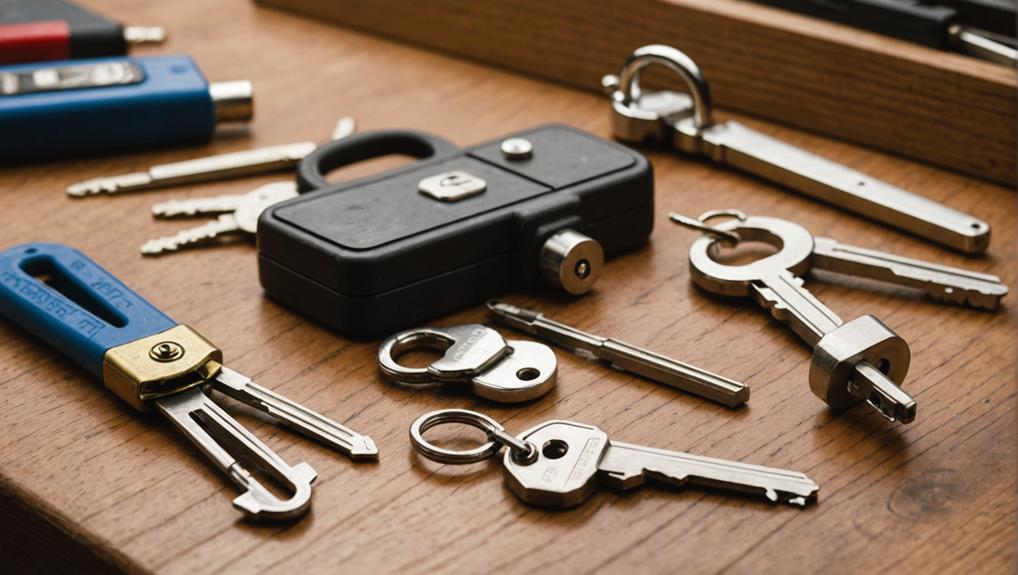
Several factors can impact how often you should rekey your business locks. First, consider employee turnover. If your staff frequently changes, you'll want to rekey your locks more often to protect sensitive information and guarantee a secure environment for your clients.
Navigating the challenges of re-keying is essential for maintaining a safe workspace, especially with a high turnover rate.
Next, think about the nature of your business. If you handle valuable assets or sensitive data, a more frequent rekeying schedule is advisable.
Additionally, if you've experienced any security breaches or attempted break-ins, it's vital to rekey your locks immediately to maintain trust and safety.
The type of locks you use also plays a role. High-security locks may require less frequent rekeying due to their advanced technology, while standard locks might need more regular attention.
Lastly, your business's specific security policies and practices should guide your timeline. Regularly reviewing your security measures allows you to adapt your rekeying frequency as needed.
Signs You Need to Rekey
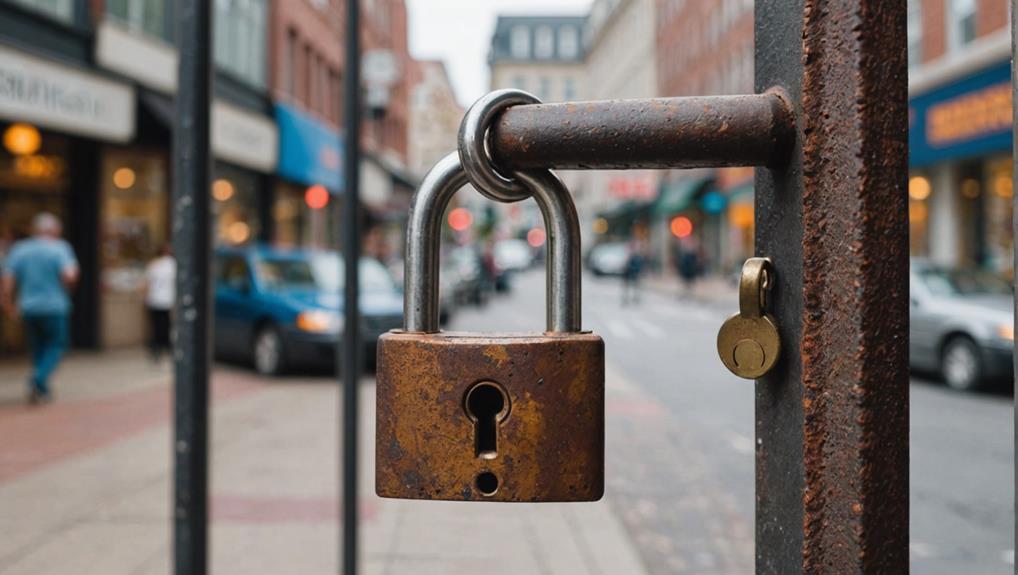
If you've recently lost keys or experienced employee turnover, it might be time to contemplate rekeying your locks.
It's also important to be aware of your legal obligations regarding security measures, such as tenant move-out re-keying laws.
Additionally, any security breach concerns should prompt an immediate reassessment of your lock system.
Recognizing these signs can help you maintain a secure environment for your business.
Lost Keys Incident
Losing your keys can be a stressful experience, and it raises an important question: how secure is your business? When you can't find your keys, it's crucial to evaluate the potential risks to your property and assets. If your keys fell into the wrong hands, you might be putting your business at significant risk.
First, consider the nature of your business. Do you handle sensitive information or valuable inventory? If so, the stakes are even higher. You should act quickly to rekey your locks to prevent unauthorized access.
Don't wait for a break-in to happen; rekeying after a lost keys incident is a proactive measure to protect what matters most.
Additionally, if you frequently misplace your keys, it might be time to examine your key management practices. Establishing a more organized system can help minimize future stress and maintain your business's security.
Ultimately, if you've lost your keys, don't ignore it. Taking swift action to rekey your locks not only safeguards your business but also reflects your commitment to providing a safe environment for your employees and clients.
Prioritize security and peace of mind by addressing the situation promptly.
Employee Turnover Rate
High employee turnover can be a red flag for your business, signaling that it might be time to rekey your locks. When employees leave, they often take keys with them, whether intentionally or not. This can create a potential security risk, especially if you've got sensitive areas that require restricted access.
As you welcome new team members, the last thing you want is to worry about who's access to your premises. Rekeying your locks not only enhances security but also fosters a sense of safety and trust among your current employees. They'll feel more secure knowing that only authorized personnel can enter restricted areas.
Additionally, if you notice patterns of employees leaving within short periods, it's wise to reassess your onboarding and retention strategies. While you're addressing the internal culture, don't forget to safeguard your physical space as well.
Regularly rekeying your locks, particularly during times of high turnover, is a proactive step that shows your commitment to maintaining a secure environment. It's about protecting your business, your employees, and ultimately, the clients you serve.
Security Breach Concerns
Employee turnover isn't the only reason to contemplate rekeying your locks.
If you've recently experienced a security breach, it's essential to act quickly. Even if nothing was stolen, a breach signals that someone gained unauthorized access to your premises. Trust your instincts: if something feels off, it likely is.
Consider rekeying your locks if an employee leaves under questionable circumstances or if you suspect that someone may have made copies of your keys without authorization.
Similarly, if you've had visitors or contractors who'd access to your facilities, rekeying can provide peace of mind.
It's also wise to rekey after a break-in, no matter how minor the incident may seem.
Each of these situations can leave your business vulnerable, and rekeying is a simple way to reinforce your security.
Benefits of Regular Rekeying
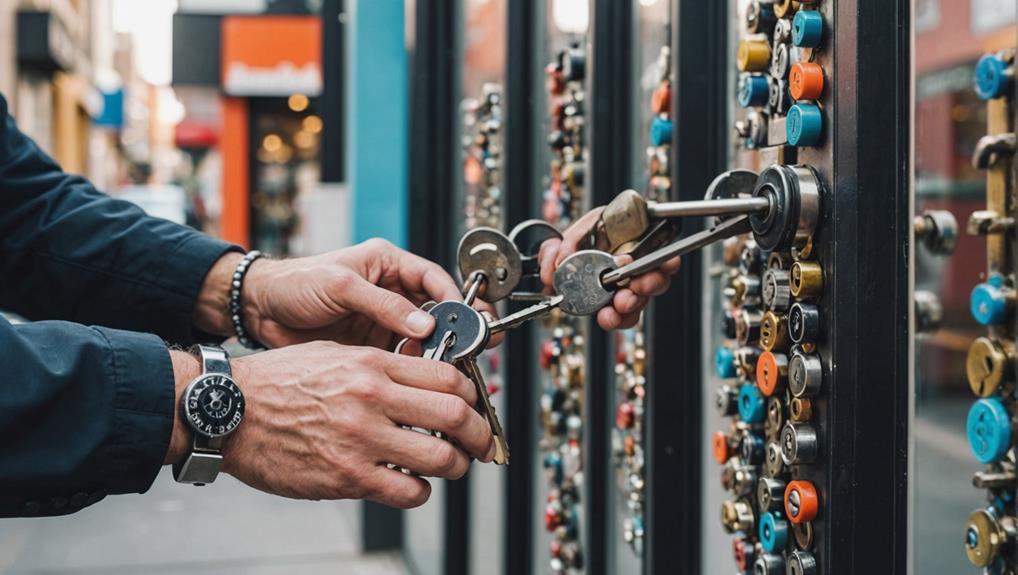
Why should you consider rekeying your business locks regularly? The benefits are numerous, and they can greatly enhance the security and peace of mind for you and your team. Regularly rekeying your locks helps to guarantee that only authorized personnel have access, which is crucial in maintaining a safe workplace.
| Benefit | Description | Impact |
|---|---|---|
| Enhanced Security | Limits access to only those who need it. | Reduces risk of unauthorized entry. |
| Cost-Effective | Rekeying is often cheaper than replacing locks. | Saves money while improving security. |
| Peace of Mind | Knowing you control access gives you confidence. | Fosters a secure work environment. |
| Adaptability | Easily adjust access as staff changes or leaves. | Guarantees security aligns with current needs. |
Professional Rekeying Services
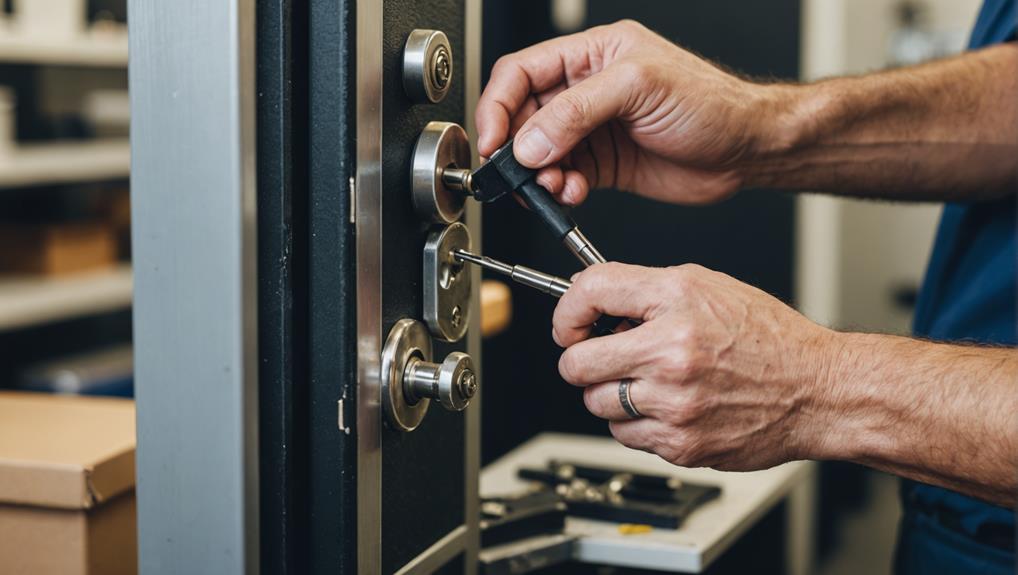
When it comes to maintaining your business's security, professional rekeying services offer a reliable solution for managing access to your premises. By hiring skilled technicians, you guarantee that the process is handled safely and effectively.
These professionals have the expertise to quickly rekey your locks, saving you time and reducing the risk of error that might occur if you attempted it yourself. Additionally, re-keying locks can be a more cost-effective option than replacing them entirely, leading to long-term savings for your business, especially when considering the advantages of re-keying locks.
Using a professional service means you'll benefit from their knowledge of various lock types and security systems. They can provide tailored solutions that fit your unique business needs, making certain that only authorized personnel have access to sensitive areas.
This is essential for fostering a secure environment where employees and clients feel safe. Moreover, professional services often come with warranties or guarantees, giving you peace of mind that the job is done right.
They can also offer advice on additional security measures to enhance your overall system. By investing in expert rekeying services, you're not only protecting your business but also demonstrating a commitment to a safe and secure workplace for everyone involved.
Prioritizing security helps you serve your employees and clients better, creating trust and reliability in your organization.
Cost Considerations for Rekeying
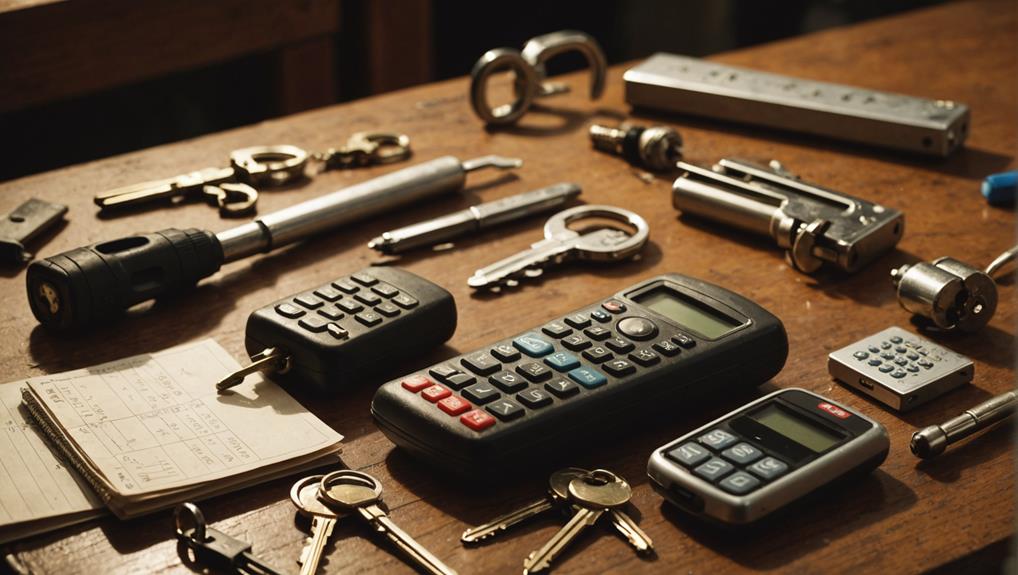
Rekeying your business locks is a cost-effective way to enhance security without breaking the bank. When you weigh the benefits against the costs, you'll find rekeying is often more affordable than replacing locks entirely.
Typically, hiring a locksmith to rekey a standard lock can range from $20 to $50 per lock, depending on your location and the complexity of the job. Additionally, understanding the costs involved in lock re-keying can help you make an informed decision about your security needs.
Consider how often you need to rekey based on your business's unique situation. If you've had recent employee turnover or suspect unauthorized access, rekeying can save you from potential losses.
While it's tempting to take a DIY approach, remember that professional services guarantee the job's done right, securing your premises effectively.
In addition, think about the long-term savings. By maintaining your existing locks and simply rekeying them, you're investing in a safer environment for your employees and customers.
This proactive approach can also enhance your reputation, showing that you prioritize safety. Ultimately, rekeying isn't just an expense; it's a valuable investment in your business's security and peace of mind.
Frequently Asked Questions
Can I Rekey My Locks Myself?
Yes, you can rekey your locks yourself if you have the right tools and a bit of know-how.
First, purchase a rekeying kit compatible with your lock type. Follow the instructions carefully to remove the cylinder and replace the pins.
It's a rewarding task that can enhance your security. Just remember, if you run into any issues or feel unsure, it's always best to consult a professional locksmith for assistance.
What Tools Do I Need for Rekeying?
Rekeying your locks is like breathing new life into your security.
To tackle this task, you'll need a few essential tools: a rekeying kit, which usually includes a change key, a follower, and pins.
You'll also want a small screwdriver and pliers to help manipulate the lock's components.
With these tools in hand, you're ready to enhance your security and serve your community by ensuring their safety.
It's a rewarding journey!
How Long Does the Rekeying Process Take?
Rekeying your locks typically takes about 15 to 30 minutes per lock, depending on your experience and the complexity of the locking mechanism.
If you're doing it yourself, gathering the necessary tools beforehand can speed up the process.
If you hire a professional, they'll handle everything efficiently, allowing you to focus on serving your customers.
Are All Lock Types Rekeyable?
Not all lock types are rekeyable.
While many standard pin tumbler locks can easily be rekeyed, some high-security locks or electronic locks mightn't allow for this option.
It's crucial to check the specific lock model you're dealing with.
If you're unsure, consult a locksmith; they can guide you on whether rekeying is possible for your locks, ensuring your security needs are effectively met.
Always prioritize keeping your property safe!
What Should I Do With Old Keys?
When you've got old keys lying around, it's essential to handle them responsibly.
You should start by identifying which keys are no longer in use.
Then, consider securely disposing of them to prevent unauthorized access. You can either cut them up or return them to a locksmith for proper disposal.
If you're unsure, simply store them safely until you can confirm they're no longer needed.
Keeping your space secure is always a priority!
Conclusion
Rekeying your business locks is like renewing the paint on a canvas; it revitalizes security and protects your masterpiece. By staying vigilant and rekeying regularly, you're not just guarding your assets but also nurturing peace of mind. Remember, a secure environment fosters creativity and productivity. So, don't wait for the storm to hit—take proactive steps to safeguard your haven. In the world of business, a little precaution goes a long way in ensuring your success shines brightly.


